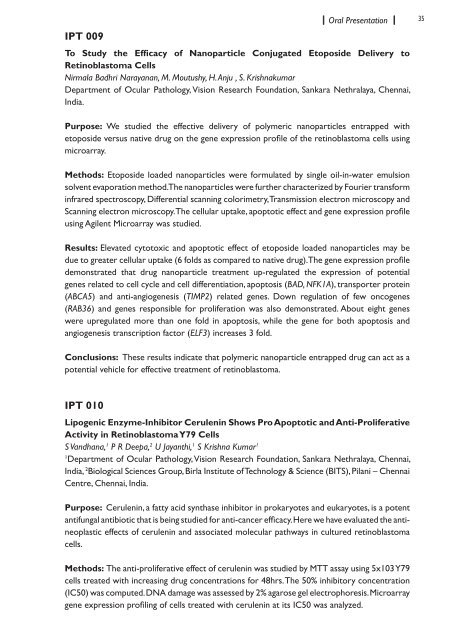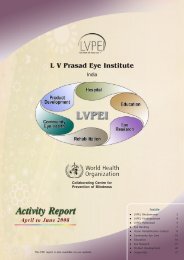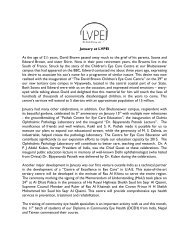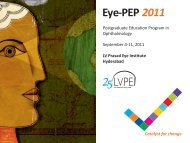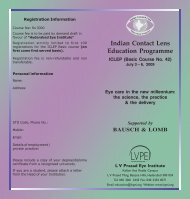IERG Abstracrt Book.indd - LV Prasad Eye Institute
IERG Abstracrt Book.indd - LV Prasad Eye Institute
IERG Abstracrt Book.indd - LV Prasad Eye Institute
You also want an ePaper? Increase the reach of your titles
YUMPU automatically turns print PDFs into web optimized ePapers that Google loves.
IPT 009Oral Presentation35To Study the Efficacy of Nanoparticle Conjugated Etoposide Delivery toRetinoblastoma CellsNirmala Badhri Narayanan, M. Moutushy, H. Anju , S. KrishnakumarDepartment of Ocular Pathology, Vision Research Foundation, Sankara Nethralaya, Chennai,India.Purpose: We studied the effective delivery of polymeric nanoparticles entrapped withetoposide versus native drug on the gene expression profile of the retinoblastoma cells usingmicroarray.Methods: Etoposide loaded nanoparticles were formulated by single oil-in-water emulsionsolvent evaporation method. The nanoparticles were further characterized by Fourier transforminfrared spectroscopy, Differential scanning colorimetry, Transmission electron microscopy andScanning electron microscopy. The cellular uptake, apoptotic effect and gene expression profileusing Agilent Microarray was studied.Results: Elevated cytotoxic and apoptotic effect of etoposide loaded nanoparticles may bedue to greater cellular uptake (6 folds as compared to native drug). The gene expression profiledemonstrated that drug nanoparticle treatment up-regulated the expression of potentialgenes related to cell cycle and cell differentiation, apoptosis (BAD, NFK1A), transporter protein(ABCA5) and anti-angiogenesis (TIMP2) related genes. Down regulation of few oncogenes(RAB36) and genes responsible for proliferation was also demonstrated. About eight geneswere upregulated more than one fold in apoptosis, while the gene for both apoptosis andangiogenesis transcription factor (ELF3) increases 3 fold.Conclusions: These results indicate that polymeric nanoparticle entrapped drug can act as apotential vehicle for effective treatment of retinoblastoma.IPT 010Lipogenic Enzyme-Inhibitor Cerulenin Shows Pro Apoptotic and Anti-ProliferativeActivity in Retinoblastoma Y79 CellsS Vandhana, 1 P R Deepa, 2 U Jayanthi, 1 S Krishna Kumar 11Department of Ocular Pathology, Vision Research Foundation, Sankara Nethralaya, Chennai,India, 2 Biological Sciences Group, Birla <strong>Institute</strong> of Technology & Science (BITS), Pilani – ChennaiCentre, Chennai, India.Purpose: Cerulenin, a fatty acid synthase inhibitor in prokaryotes and eukaryotes, is a potentantifungal antibiotic that is being studied for anti-cancer efficacy. Here we have evaluated the antineoplasticeffects of cerulenin and associated molecular pathways in cultured retinoblastomacells.Methods: The anti-proliferative effect of cerulenin was studied by MTT assay using 5x103 Y79cells treated with increasing drug concentrations for 48hrs. The 50% inhibitory concentration(IC50) was computed. DNA damage was assessed by 2% agarose gel electrophoresis. Microarraygene expression profiling of cells treated with cerulenin at its IC50 was analyzed.


